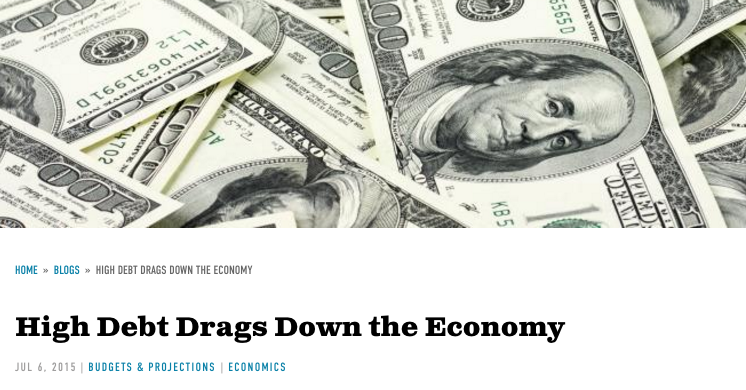The Debt Discussion During Last Night's Debate Was a Major Letdown

By:
The big story out of Wednesday night's third and final presidential debate was Republican presidential candidate Donald Trump's refusal to commit to accepting the results of November's election.
But there was a smaller story that merits some consideration as well.
It came during the final moments of the debate, when moderator Chris Wallace asked Trump and former Secretary of State Hillary Clinton the following question:
“Our national debt as a share of the economy, our DGP, is now at 77 percent. that’s the highest since just after world war 2. But the non-partisan Committee for a Responsible Federal Budget says, Secretary Clinton, under you plan, the debt would rise to 86 percent over the next 10 years. Mr. Trump, under you plan, they say it would rise to 105 percent of GDP over the next 10 years. The question is, why are both of you ignoring this problem?”
Trump didn't directly address it.
Instead of outlining a plan to reduce the national debt, Trump promised to create "a tremendous economic machine."
Former Secretary of State Hillary Clinton was more straightforward.
She told Wallace, "I pay for everything I am proposing. I do not add a cent to the national debt. I take that very seriously, because I do think it’s one issue we have to come to grips with.”
Implicit in both Wallace's question and Clinton's answer is the belief the national debt is a major problem that must be fixed. That's because, as Wallace noted, the question came courtesy of the Committee for a Responsible Federal Budget. And though they are a non-partisan group, they are also firm believers in the idea that the national debt is too high and must be reduced.
Their website includes headlines like this...
 cfrb.org
cfrb.org
...and this.
 cfrb.org
cfrb.org
And in September, they wrote the following on their website.
Debt held by the public currently totals over $14 trillion – nearly 77 percent of Gross Domestic Product (GDP) – and is projected to grow as a share of the economy to almost 86 percent by 2026 and about 150 percent by 2050. This large and growing national debt threatens to slow economic growth and is ultimately unsustainable. Yet neither presidential candidate has a plan to address it.
But is national debt as scary as it sounds? Not everyone thinks so.
First of all, the debt isn't spiraling out of control. Back in April, Bloomberg View's Noah Smith wrote:
The federal debt held by the public is now growing at about a 3 percent rate, while the economy is growing at about a 3.4 percent rate (these are both in nominal terms). In other words, the U.S. deficit is now perfectly sustainable.
In fact, Slate's Jordan Weissmann sees a major lost opportunity in Clinton's answer about her budget plan. He thinks the United States shouldn't be afraid to borrow money to invest in the country's roads or water systems. He writes:
Frankly, we've been shooting ourselves in the foot by refusing to borrow more during this era of rock-bottom interest rates, which would allow us to finance investments in infrastructure and push the economy back to its full potential for practically nothing. Investors are all but begging the United States and other countries for new bonds. We should oblige them.
In short, the notion that the national debt is a "crisis" is a matter of debate, not a given.
Stephanie Kelton, a Professor of Economics at the University of Missouri and former economic advisor to Sen. Bernie Sanders' presidential campaign, told ATTN: that attempts to frame the national debt as a crisis are, in reality, just veiled attempt to force spending cuts on programs like social security.
“The notion that the federal government could run out of money and wouldn't know where to get money, is just completely rubbish," Kelton said, while dismissing comparisons between debts held by American households and the American government, which can print its own currency.
"The permission slip is that we have our own currency," Kelton said. "This is not a puzzle, this is about political will."
Of course, those who believe the national debt is a problem have pushed back on Kelton's position, arguing that giving the government free reign to print money to pay down its debts will lead to inflation. Kelton's theory has a response for that as well, positing that there's enough demand for products, and enough people willing to work to make them, that we don't need to worry about inflation, or, "too much money chasing too few goods."
But the argument between Kelton and more deficit-dreading economists is itself the best evidence that Wallace's question missed the mark. Perhaps instead of asking the candidates, "What are you going to do to solve this problem," he should have asked "Do you even agree that there's a problem in the first place?"
